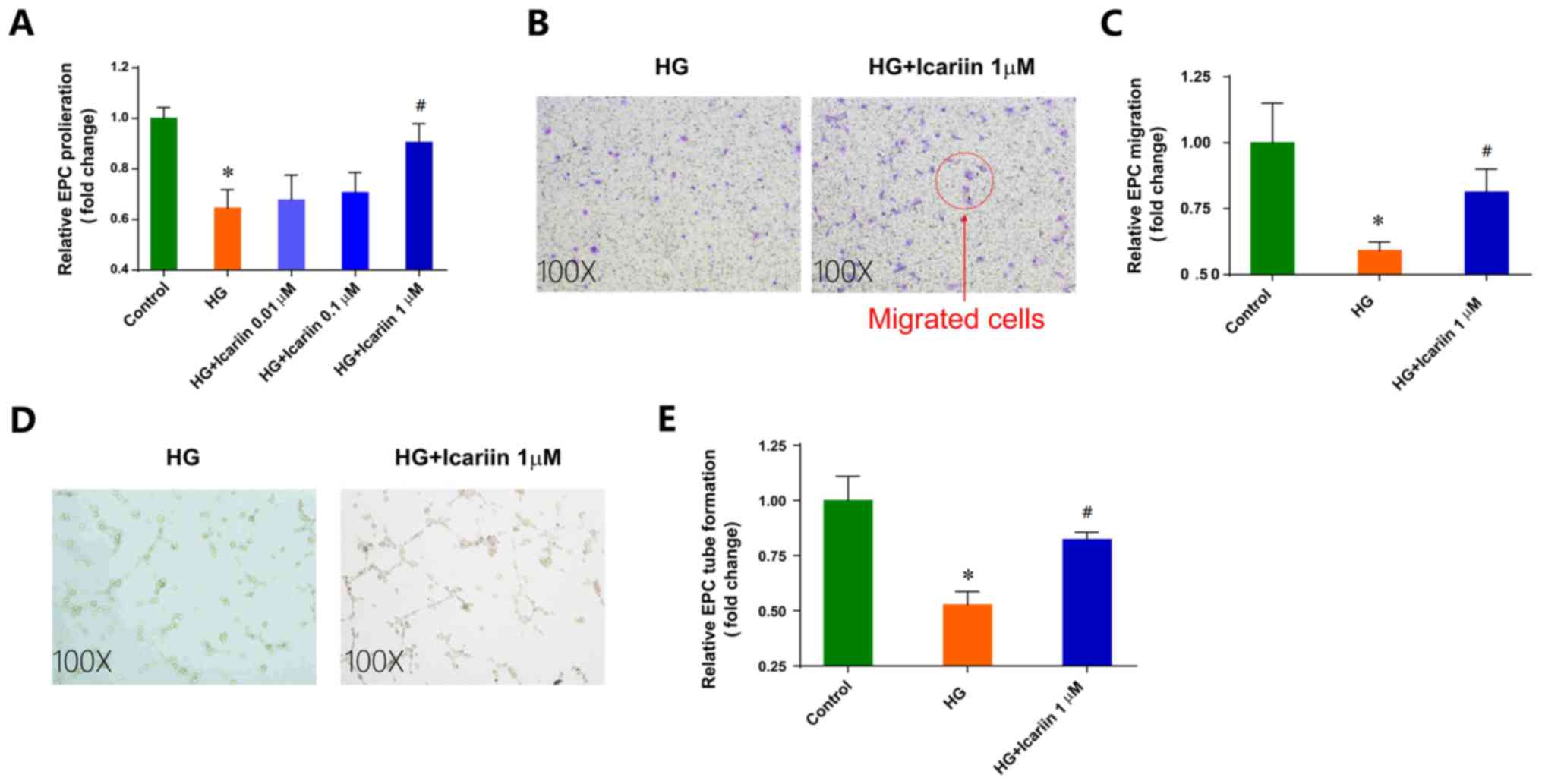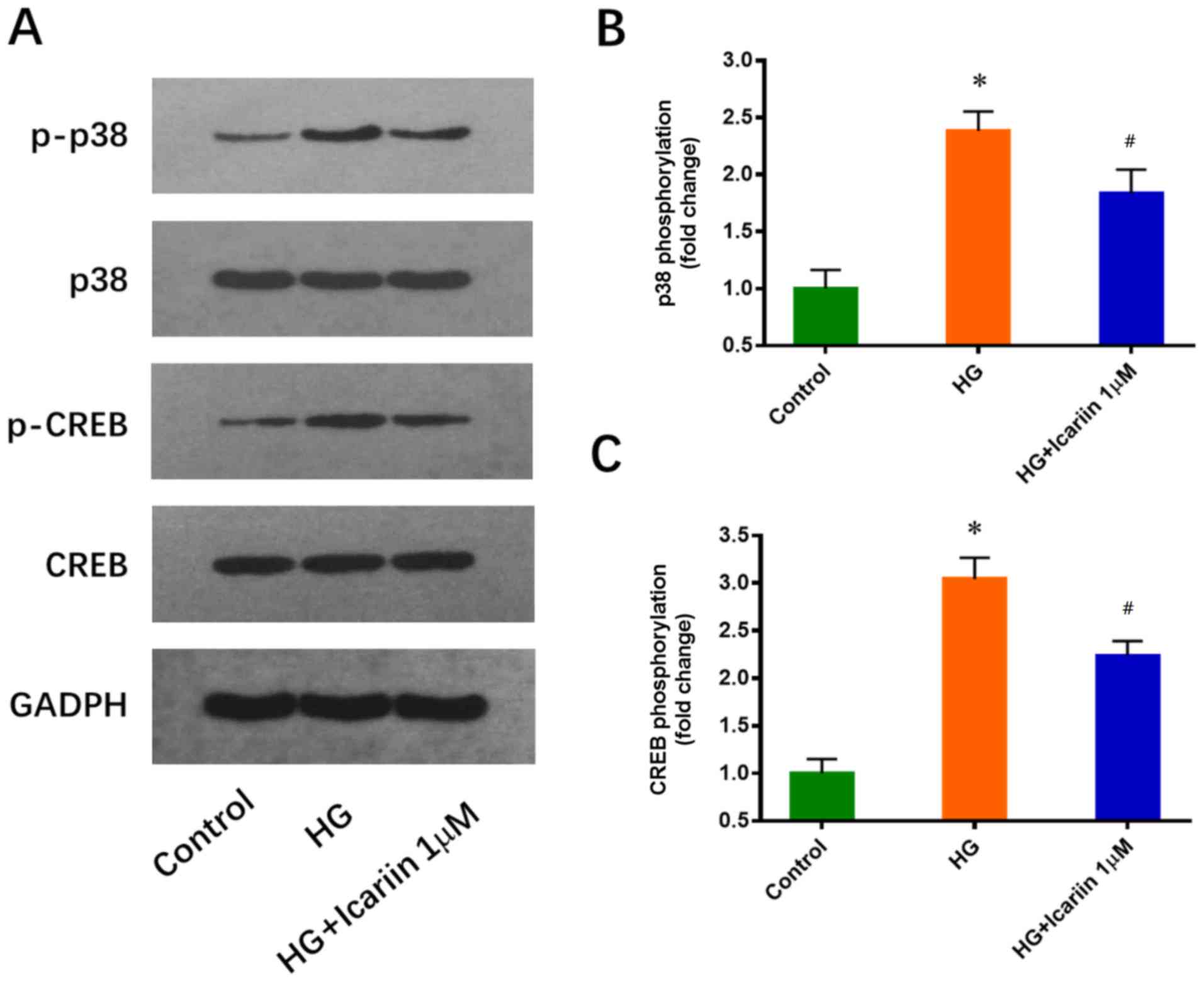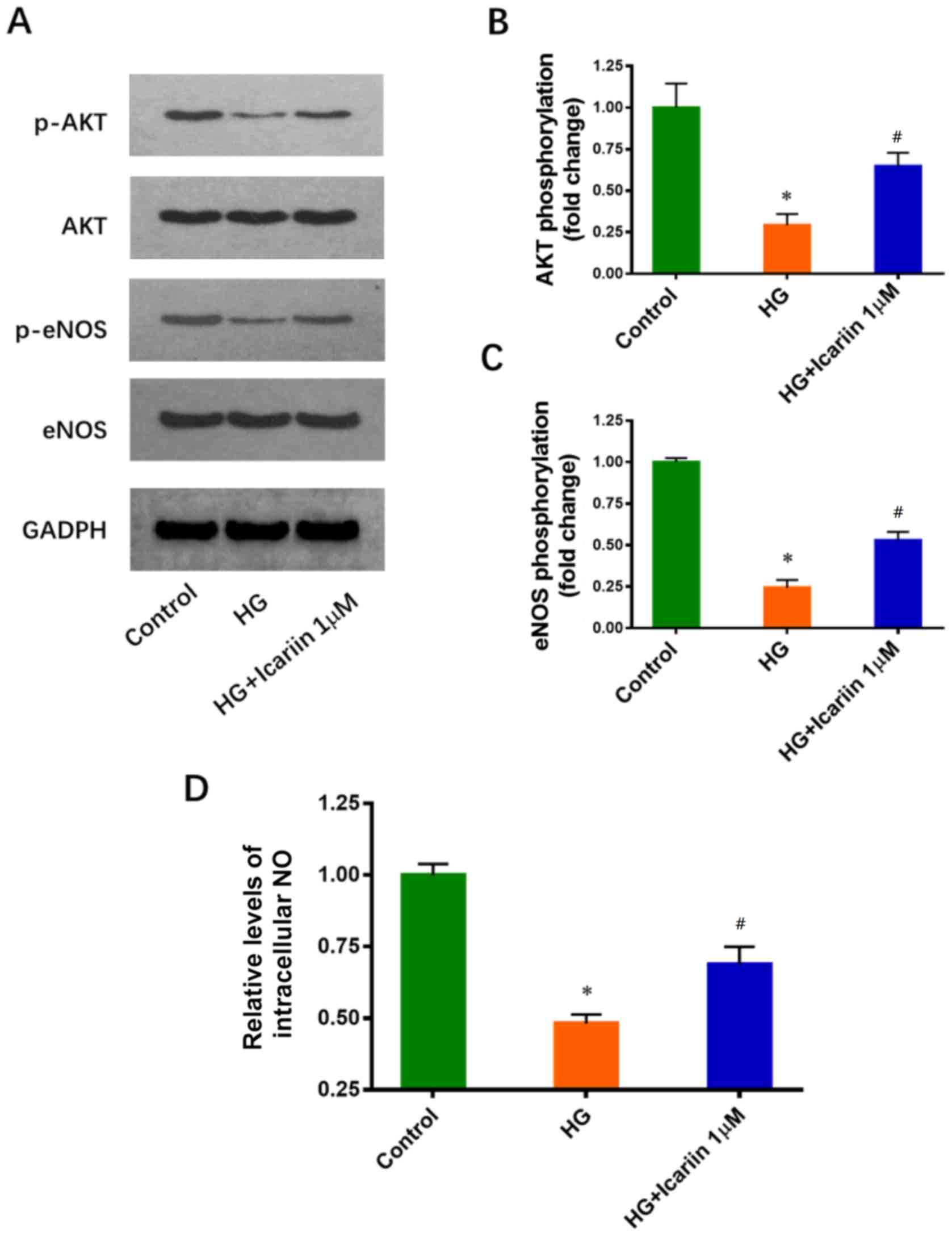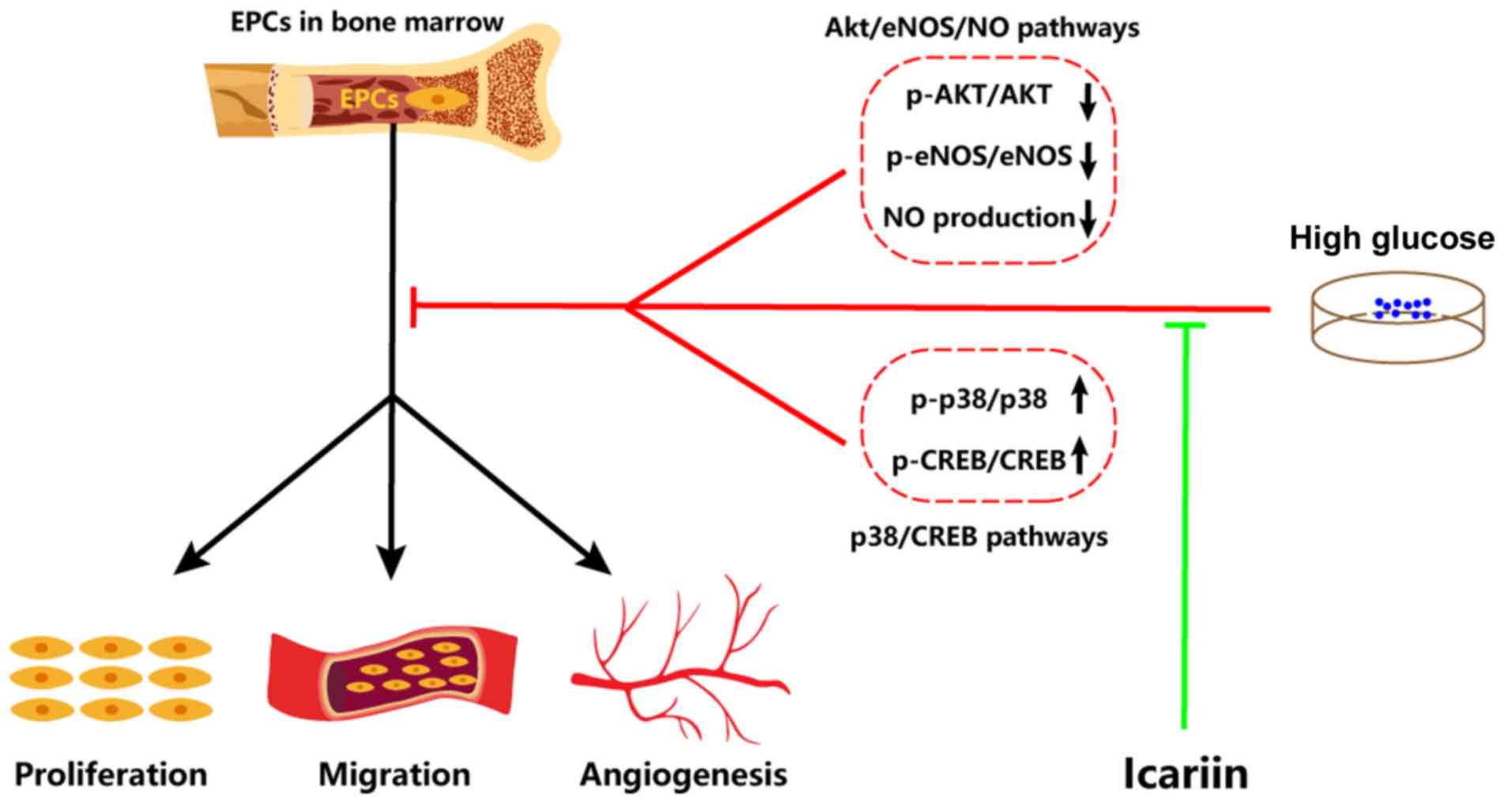|
1
|
Asahara T, Masuda H, Takahashi T, Kalka C,
Pastore C, Silver M, Kearne M, Magner M and Isner JM: Bone marrow
origin of endothelial progenitor cells responsible for postnatal
vasculogenesis in physiological and pathological
neovascularization. Circ Res. 85:221–228. 1999. View Article : Google Scholar : PubMed/NCBI
|
|
2
|
Jin P, Li T, Li X, Shen X and Zhao Y:
Suppression of oxidative stress in endothelial progenitor cells
promotes angiogenesis and improves cardiac function following
myocardial infarction in diabetic mice. Exp Ther Med. 11:2163–2170.
2016. View Article : Google Scholar : PubMed/NCBI
|
|
3
|
Jaipersad AS, Lip GY, Silverman S and
Shantsila E: The role of monocytes in angiogenesis and
atherosclerosis. J Am Coll Cardiol. 63:1–11. 2014. View Article : Google Scholar : PubMed/NCBI
|
|
4
|
Odent Grigorescu G, Preda MB, Radu E,
Rosca AM, Tutuianu R, Mitroi DN, Simionescu M and Burlacu A:
Combinatorial approach for improving the outcome of angiogenic
therapy in ischemic tissues. Biomaterials. 60:72–81. 2015.
View Article : Google Scholar : PubMed/NCBI
|
|
5
|
Shantsila E, Watson T and Lip GY:
Endothelial progenitor cells in cardiovascular disorders. J Am Coll
Cardiol. 49:741–752. 2007. View Article : Google Scholar : PubMed/NCBI
|
|
6
|
Vasa M, Fichtlscherer S, Aicher A, Adler
K, Urbich C, Martin H, Zeiher AM and Dimmeler S: Number and
migratory activity of circulating endothelial progenitor cells
inversely correlate with risk factors for coronary artery disease.
Circ Res. 89:E1–E7. 2001. View Article : Google Scholar : PubMed/NCBI
|
|
7
|
Fadini GP, Sartore S, Albiero M, Baesso I,
Murphy E, Menegolo M, Grego F, Vigili de Kreutzenberg S, Tiengo A,
Agostini C, et al: Number and function of endothelial progenitor
cells as a marker of severity for diabetic vasculopathy.
Arterioscler Thromb Vasc Biol. 26:2140–2146. 2006. View Article : Google Scholar : PubMed/NCBI
|
|
8
|
Fadini GP, Miorin M, Facco M, Bonamico S,
Baesso I, Grego F, Menegolo M, de Kreutzenberg SV, Tiengo A,
Agostini C, et al: Circulating endothelial progenitor cells are
reduced in peripheral vascular complications of type 2 diabetes
mellitus. J Am Coll Cardiol. 45:1449–1457. 2005. View Article : Google Scholar : PubMed/NCBI
|
|
9
|
Tsukada S, Masuda H, Jung SY, Yun J, Kang
S, Kim DY, Park JH, Ji ST, Kwon SM and Asahara T: Impaired
development and dysfunction of endothelial progenitor cells in type
2 diabetic mice. Diabetes Metab. 43:154–162. 2017. View Article : Google Scholar : PubMed/NCBI
|
|
10
|
Chang J, Li Y, Huang Y, Lam KS, Hoo RL,
Wong WT, Cheng KK, Wang Y, Vanhoutte PM and Xu A: Adiponectin
prevents diabetic premature senescence of endothelial progenitor
cells and promotes endothelial repair by suppressing the p38 MAP
kinase/p16INK4A signaling pathway. Diabetes. 59:2949–2959. 2010.
View Article : Google Scholar : PubMed/NCBI
|
|
11
|
Sun N, Wang H and Wang L: Vaspin
alleviates dysfunction of endothelial progenitor cells induced by
high glucose via PI3K/Akt/eNOS pathway. Int J Clin Exp Pathol.
8:482–489. 2015.PubMed/NCBI
|
|
12
|
Chen YH, Lin SJ, Lin FY, Wu TC, Tsao CR,
Huang PH, Liu PL, Chen YL and Chen JW: High glucose impairs early
and late endothelial progenitor cells by modifying nitric
oxide-related but not oxidative stress-mediated mechanisms.
Diabetes. 56:1559–1568. 2007. View Article : Google Scholar : PubMed/NCBI
|
|
13
|
Shen R and Wang JH: The effect of icariin
on immunity and its potential application. Am J Clin Exp Immunol.
7:50–56. 2018.PubMed/NCBI
|
|
14
|
Jin J, Wang H, Hua X, Chen D, Huang C and
Chen Z: An outline for the pharmacological effect of icariin in the
nervous system. Eur J Pharmacol. 842:20–32. 2019. View Article : Google Scholar : PubMed/NCBI
|
|
15
|
Wang Z, Wang D, Yang D, Zhen W, Zhang J
and Peng S: The effect of icariin on bone metabolism and its
potential clinical application. Osteoporos Int. 29:535–544. 2018.
View Article : Google Scholar : PubMed/NCBI
|
|
16
|
Qian ZQ, Wang YW, Li YL, Li YQ, Ling-Zhu
and Yang DL: Icariin prevents hypertension-induced cardiomyocyte
apoptosis through the mitochondrial apoptotic pathway. Biomed
Pharmacother. 88:823–831. 2017. View Article : Google Scholar : PubMed/NCBI
|
|
17
|
Xu HB and Huang ZQ: Icariin enhances
endothelial nitric-oxide synthase expression on human endothelial
cells in vitro. Vascul Pharmacol. 47:18–24. 2007. View Article : Google Scholar : PubMed/NCBI
|
|
18
|
Song E, Lu CW, Fang LJ and Yang W: Culture
and identification of endothelial progenitor cells from human
umbilical cord blood. Int J Ophthalmol. 3:49–53. 2010.PubMed/NCBI
|
|
19
|
Hamed S, Brenner B, Abassi Z, Aharon A,
Daoud D and Roguin A: Hyperglycemia and oxidized-LDL exert a
deleterious effect on endothelial progenitor cell migration in type
2 diabetes mellitus. Thromb Res. 126:166–174. 2010. View Article : Google Scholar : PubMed/NCBI
|
|
20
|
Koizumi H, Yu J, Hashimoto R, Ouchi Y and
Okabe T: Involvement of androgen receptor in nitric oxide
production induced by icariin in human umbilical vein endothelial
cells. FEBS Lett. 584:2440–2444. 2010. View Article : Google Scholar : PubMed/NCBI
|
|
21
|
Ma FX, Chen F, Ren Q and Han ZC:
Lovastatin restores the function of endothelial progenitor cells
damaged by oxLDL. Acta Pharmacol Sin. 30:545–552. 2009. View Article : Google Scholar : PubMed/NCBI
|
|
22
|
Cheng L, Xu J, Qian YY, Pan HY, Yang H,
Shao MY, Cheng R and Hu T: Interaction between mDia1 and ROCK in
Rho-induced migration and adhesion of human dental pulp cells. Int
Endod J. 50:15–23. 2017. View Article : Google Scholar : PubMed/NCBI
|
|
23
|
Ross S, Gerstein HC, Eikelboom J, Anand
SS, Yusuf S and Paré G: Mendelian randomization analysis supports
the causal role of dysglycaemia and diabetes in the risk of
coronary artery disease. Eur Heart J. 36:1454–1462. 2015.
View Article : Google Scholar : PubMed/NCBI
|
|
24
|
Li C, Li Q, Mei Q and Lu T:
Pharmacological effects and pharmacokinetic properties of icariin,
the major bioactive component in Herba Epimedii. Life Sci.
126:57–68. 2015. View Article : Google Scholar : PubMed/NCBI
|
|
25
|
Seeger FH, Haendeler J, Walter DH,
Rochwalsky U, Reinhold J, Urbich C, Rössig L, Corbaz A, Chvatchko
Y, Zeiher AM, et al: p38 mitogen-activated protein kinase
downregulates endothelial progenitor cells. Circulation.
111:1184–1191. 2005. View Article : Google Scholar : PubMed/NCBI
|
|
26
|
Xiao HB, Liu ZK, Lu XY, Deng CN and Luo
ZF: Icariin regulates PRMT/ADMA/DDAH pathway to improve endothelial
function. Pharmacological reports: PR. 67:1147–1154. 2015.
View Article : Google Scholar : PubMed/NCBI
|
|
27
|
Xiao-Hong D, Chang-Qin X, Jian-Hua H,
Wen-Jiang Z and Bing S: Icariin delays homocysteine-induced
endothelial cellular senescence involving activation of the
PI3K/AKT-eNOS signaling pathway. Pharm Biol. 51:433–440. 2013.
View Article : Google Scholar : PubMed/NCBI
|
|
28
|
Chung BH, Kim JD, Kim CK, Kim JH, Won MH,
Lee HS, Dong MS, Ha KS, Kwon YG and Kim YM: Icariin stimulates
angiogenesis by activating the MEK/ERK- and PI3K/Akt/eNOS-dependent
signal pathways in human endothelial cells. Biochem Biophys Res
Commun. 376:404–408. 2008. View Article : Google Scholar : PubMed/NCBI
|
|
29
|
Song YH, Cai H, Zhao ZM, Chang WJ, Gu N,
Cao SP and Wu ML: Icariin attenuated oxidative stress
induced-cardiac apoptosis by mitochondria protection and ERK
activation. Biomed Pharmacother. 83:1089–1094. 2016. View Article : Google Scholar : PubMed/NCBI
|
|
30
|
Wang HY, Gao PJ, Ji KD, Shen WF, Fan CL,
Lu L and Zhu DL: Circulating endothelial progenitor cells,
C-reactive protein and severity of coronary stenosis in Chinese
patients with coronary artery disease. Hypertension Research:
Official Journal of the Japanese Society of Hypertension.
30:133–141. 2007. View Article : Google Scholar : PubMed/NCBI
|
|
31
|
Huang PH, Chen JW, Lin CP, Chen YH, Wang
CH, Leu HB and Lin SJ: Far infra-red therapy promotes
ischemia-induced angiogenesis in diabetic mice and restores high
glucose-suppressed endothelial progenitor cell functions.
Cardiovasc Diabetol. 11:992012. View Article : Google Scholar : PubMed/NCBI
|
|
32
|
Ding L, Liang XG, Hu Y, Zhu DY and Lou YJ:
Involvement of p38MAPK and reactive oxygen species in
icariin-induced cardiomyocyte differentiation of murine embryonic
stem cells in vitro. Stem Cells Dev. 17:751–760. 2008.
View Article : Google Scholar : PubMed/NCBI
|
|
33
|
Qin S, Zhou W, Liu S, Chen P and Wu H:
Icariin stimulates the proliferation of rat bone mesenchymal stem
cells via ERK and p38 MAPK signaling. Int J Clin Exp Med.
8:7125–7133. 2015.PubMed/NCBI
|
|
34
|
Taguchi K, Hida M, Hasegawa M, Matsumoto T
and Kobayashi T: Dietary polyphenol morin rescues endothelial
dysfunction in a diabetic mouse model by activating the Akt/eNOS
pathway. Mol Nutr Food Res. 60:580–588. 2016. View Article : Google Scholar : PubMed/NCBI
|
|
35
|
Hamed S, Brenner B and Roguin A: Nitric
oxide: A key factor behind the dysfunctionality of endothelial
progenitor cells in diabetes mellitus type-2. Cardiovasc Res.
91:9–15. 2011. View Article : Google Scholar : PubMed/NCBI
|


















